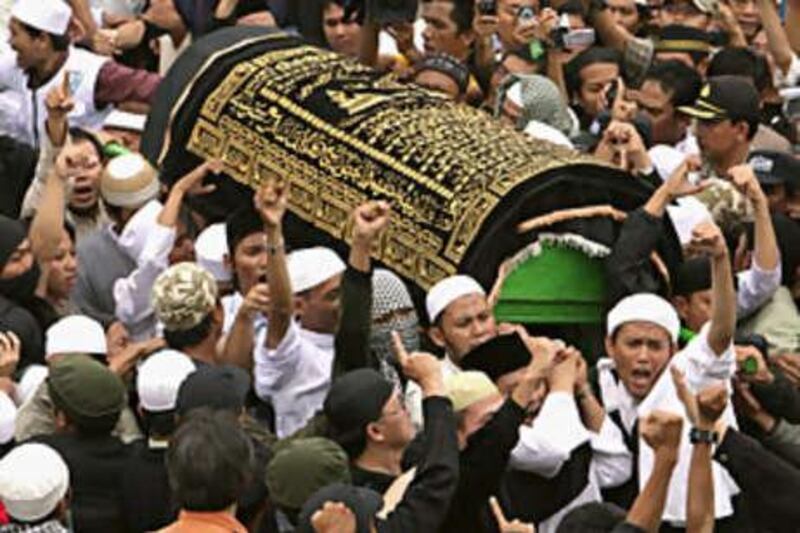TENGGULUN, INDONESIA // Authorities in Indonesia were today braced for possible revenge attacks by hardliners after three militants were executed by firing squad for the 2002 Bali bombings. The bodies of Imam Samudra, 38, and brothers Amrozi Nurhasyim, 47, and Ali Ghufron, 48, were brought by helicopter from the prison island of Nusakambangan to their villages in east and west Java, ending years of uncertainty about their fate.
The executions, sensitive for both political and security reasons, had been postponed many times, frustrating survivors and relatives of victims, and enabling the bombers to rally supporters from behind bars. Thousands turned out in the towns of Tenggulun and Serang earlier today to meet the bodies. Others scuffled briefly with police, but there were no serious disturbances. The Oct 12, 2002, attacks - allegedly funded by al Qa'eda and carried out by members of the South-east Asian militant group Jemaah Islamiyah - killed 202 people, including 88 Australians, and were the first of several suicide bombings that thrust the nation onto the front lines in the war on terror.
Security forces were placed on high alert ahead of the midnight executions. Extra police were deployed in their hometowns and at embassies, shopping malls and offices in the capital, Jakarta. "Everyone should be extra vigilant," said Ken Conboy, a Jakarta-based security expert, anticipating demonstrations and bomb hoaxes rather than fresh attacks. But, he noted, even peaceful rallies "can quickly spin out of control".
The US and Australian embassies, which received bomb threats in recent days, were among those warning their citizens to be careful. It was a day of mixed emotions for survivors and relatives of victims in Australia. Brian Deegan of Adelaide, who lost his son Josh in the bombings, said "the tears don't roll quite as often, that absolute gut-ache has diminished a bit," but that nothing will ever make the pain disappear.
He staunchly opposes capital punishment and worries about revenge attacks, even though Jemaah Islamiyah has been severely weakened by hundreds of arrests, with its last attack occurring more than three years ago. "There's no shortage around the world of persons that are prepared to commit suicide to achieve a result," Mr Deegan said. Others expressed relief that justice had been served at last. "These guys went to set about mass murder and paid the highest penalty," said Peter Hughes of Perth, who suffered horrific burns in the bombings. "It doesn't feel good, but they did do the crime and they've paid for it."
*AP





